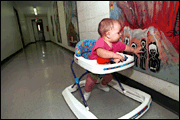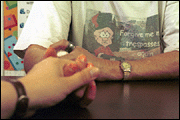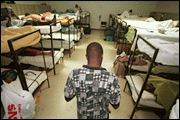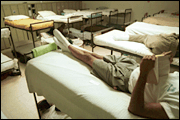

A mission to improve life
Homeless residents share stories of hope for their future
Photo by Richard Rodriguez
Scott McNichols, a former cocaine addict who has a wife and two children in Brunswick, stays up and reads the Bible before lights out at 10 p.m. at Grace House.
By Margarita Venegas
(8/27/99 issue)
One of the youngest residents at Union Mission rolls down the hallway in a baby walker.
Eleven-month-old Amy Thornton doesn't call to mind the stereotypical image of what a homeless person looks like. Yet, she and her mother, Shannon, live in a dormitory-style room of cream-colored concrete walls and floor tiles in Magdalene House, where homeless women and their children stay.
"Basically, her father didn't want to accept responsibility for her," said 23-year-old Shannon Thornton, who attended Armstrong Atlantic State University for two years until she became pregnant. "Things progressively got worse until he finally kicked us out July 1."
Thornton, like many other residents of Magdalene House and Grace House, where homeless men stay, doesn't have family that live close to Savannah. Friends are also hard to rely on. However, Thornton said she believes the help she can receive at Union Mission provides her with enough support to get back on her feet. Since moving in, she has been able to get food stamps, money for personal needs, day care for Amy, counseling, life skills classes and support from staff members, she said.
"Most of my family moved to North Carolina," said Thornton, a Savannah native. "They are supportive because once I got here I realized the help I could get and how the benefits can help you. I told my family that it is the best thing for me to be here.
"A lot of my friends don't have children and are still in the same partying mode that (Amy's father) was," she said. "I would rather not have her in that situation. It's not me that I'm worried about anymore, it's her."
Thornton hopes to pick up her dream of becoming an elementary education teacher in the future because she loves children. Her mother and stepfather are high school teachers.
"I think you can make a difference with younger children," said Thornton, who still has two years of school left before she graduates. "I'm definitely going to go back. This is something I really want to do."
A few years ago, Thornton said she never expected to end up in a homeless shelter. Her impression of the place and its benefits have since changed.
"I didn't think it would be like this, I thought it would be a lot worse," Thornton said. "You think it will be a creepy place with creepy people. It's not that bad, you're safe here and the people who work here are here to help you. I thought of it as one type of person - someone who didn't have an education, but it's not like that. They are ordinary people who are in bad situations. It's fortunate that I can go someplace like this because I can get benefits and help for (my daughter) and we're not out on the streets."
Letitia Robinson, case manager for Magdalene House, said growing numbers of women and children are making up the homeless population. There is a waiting list of families trying to get into Magdalene House, said LaVonda Brown, Union Mission director of housing.
Residents of Union Mission stay, on average, five to six months. In that time, they have to develop a plan to get out of the shelter and stay out, said Brown.
"I can get each of these women a house today, but it's a matter of maintaining a house, as far as paying bills and having enough money for yourself," Robinson said.
Maintaining a life outside of the shelter is also about structure, she said. Both Robinson and Grace House case manager Mike Freeman sometimes hear complaints about the strict rules at Union Mission, such as the 5:30 p.m. curfew and required classes.
"You have classes and life skills workshops that you need to take," said Robinson. "You have to do chores, spend some time with your kids, then it's time for bed. This is not a place where you're going to come and sleep and leave in the morning."
For those who stay at Union Mission and are dedicated to staying off the streets, the rules are fine, said Freeman.
"Those that live here have to pay $8 a day rent, so they have to work," said Freeman. "They work all day long and come back to the shelter to live. They do backbreaking work in the middle of a hot summer."
Richard Wade has been working for a Savannah construction company since July when he was paroled from Hinesville State Prison. He served a term for burglary, which he said he committed because he was addicted to cocaine and needed to pay for the drug. Arriving at Union Mission with $25 and a set of clothes, Wade looked forward to spending the next six months at Grace House, fulfilling his rehabilitation program.
"It gives me more than just a bed to sleep in," Wade said. "I get a clean place and food."
He also borrowed a pair of athletic shoes so he could walk around Savannah looking for construction work. Wade works 10 1/2 hour days that start at 5 a.m. so he can keep his 7 p.m. curfew. His employer has faith in Wade's work ethic, going so far as to take him to the Department of Motor Vehicles to obtain a license and help get him started at work.
"He bought the tools to get me started and since then has put a quarter of my salary into buying more tools," Wade said.
Time in prison helped Wade take responsibility for the destruction of his family support, but also gave him greater faith in God, he said. He won't be able to see his mother, who had a stroke while he was in prison and is very weak, until he finishes his rehabilitation, so he continues to pray and has become active in a church in town.
"I'm a better person than I was a year or two ago," Wade said. "I haven't felt this good about myself since I was 18."
Many problems with homelessness stem from those who lack family support to keep them off the streets, said Micheal Elliott, Union Mission president. Substance abuse, mental illness, loss of job and loss of housing, especially due to rising rent costs, are the other big reasons for homelessness in Savannah, he said.
Started in 1936 as a response to the effects of the Depression, Union Mission has moved away from the typical behavior of offering a bed to a homeless person and branched out into rehabilitating that person and educating the public about this problem, Elliott said.
"I think society as a whole is sick of responding to need," Elliott said. "We're desensitized. What I think people really want are results."
John Howard is a carpenter who came to Grace House after spending three and a half years on and off the streets following his divorce. He grew tired of living in crack houses and other homeless shelters, and heard from others on the street that Union Mission could help him get back into society.
"They treat you with respect and they're concerned with your welfare," Howard said. "I'm looking at leaving here in about 30 days. I wish people could understand that a lot of people who come to a shelter are your average people."
Howard said he has seen doctors, lawyers and former professionals who thought they could never be homeless, but because of drug, gambling or alcohol problems ended up alienated from family and friends and out on the streets.
"The first time you mention the shelter, the things that pop into
a person's mind is drugs or bums or escaping from the law," Howard
said. "People think, 'This person is no good.' I tell them that if
they ever get in that position, they'll find out what it feels like, and
it's not very comforting."
 Eleven-month-old Amy Thornton is the youngest resident of Magdalene House, which has been home for her and mother Shannon for two months. |
 Some of the stories residents have to tell are heartbreaking, but they receive renewed strength from staff members, who help comfort them. |
 Staff member Avery Williams does a bed check to make sure everyone is in for the night and to find out who needs an earlier wake up call than the mandatory one at 5 a.m. |
 The residents of Grace House share one large room with 25 bunk beds. Each resident is assigned a bunk, a locker and a small amount of room under the bed. |
Check out our past feature stories
Home | Contact Us | Sitemap
| FAQ | Subscribe
| Survey
(c) Copyright 1999. The Georgia Guardian. All rights
reserved.
All photos shown above are by Richard Rodriguez.
No photo may be reproduced without our written permission.